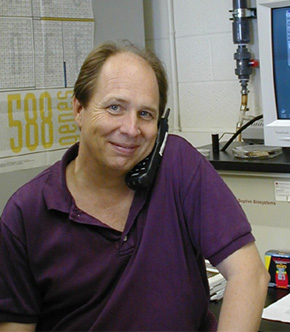The next Step: Exploring the Proteome:
Translation and Beyond
Mapping Organisms Using Proteomics:
Strategies, Technologies, and Infrastructure

Abstract:
We have used both standard and novel strategies to generate proteome maps
of E. coli membrane proteins. The maps allow us to use this system for
the early stages of technology development in proteomics. It has been
invaluable as a test bed for development of new technologies in our own
laboratory and in evaluation of new technologies from other laboratories.
Application of proteome technologies to large mapping projects on the
order of whole organisms is complicated by the rapid evolution of
instrumentation and methodologies. One consequence is that the lifetime
of a project may exceed the lifetimes of the technologies used. Another
is that software tools crucial for large, high-throughput projects always
lag behind the technologies. Other issues are the broad range of
technologies employed in proteomics, the limited pool of trained
personnel, limited resources, and a high, perceived demand for services.
These are some of the issues we have considered in developing the Michigan
Proteome Consortium, an alliance of laboratories funded by the State of
Michigan to provide support for large-scale services and to train a
workforce in proteomics. The first demonstration project of the
Consortium will provide a complete proteome analysis of a bacterial human
pathogen. High-throughput yeast two-hybrid screening will be used to
provide a thorough interaction map of the organism. Proteome mapping by
mass spectrometry will be used to characterize the proteome, provide
protein expression profiling, and corroborate the interaction map.
Protein microarrays will be used to complement these techniques. The
Consortium is also making a significant investment in bioinformatics and
software development required to support this large effort. Integration of
data and strategies for developing and managing the program will be
described.
Biographical sketch:
Name: Phil Andrews
Title: Professor, University of Michigan Medical School,
Department of Biological Chemistry.
Education: PhD from Purdue University, 1978, Biochemistry.
Professional Interests: Functional genomics (Proteomics), roles of post-translational modifications in cells,
whole organism studies, protein structure, seperation studies, & any other distractions from reality.
Personal Interests:Gardening, cooking, reading, travel, the usual stuff.
Contact Information:
Prof. Philip Andrews, Professor and Director, University of Michigan Center for Proteome Studies
Department of Biological Chemistry, University of Michigan Medical School, 1301 Catherine St., Ann Arbor, MI 48109-0606
Phone: 734.615.2452, Fax: 734.647.0951, e-mail: andrewsp@umich.edu.
